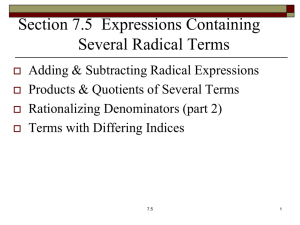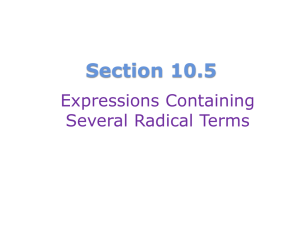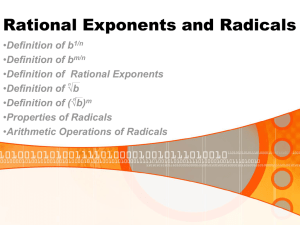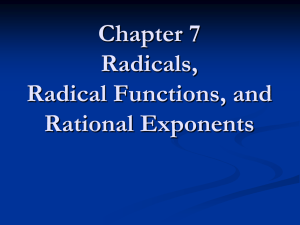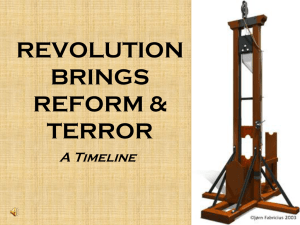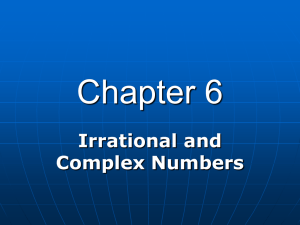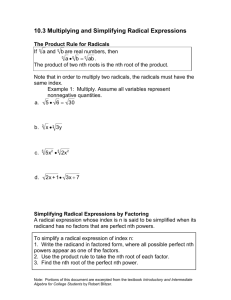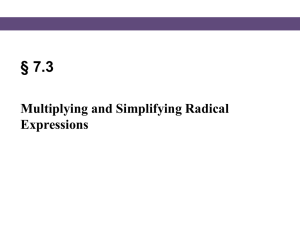Chapter 7
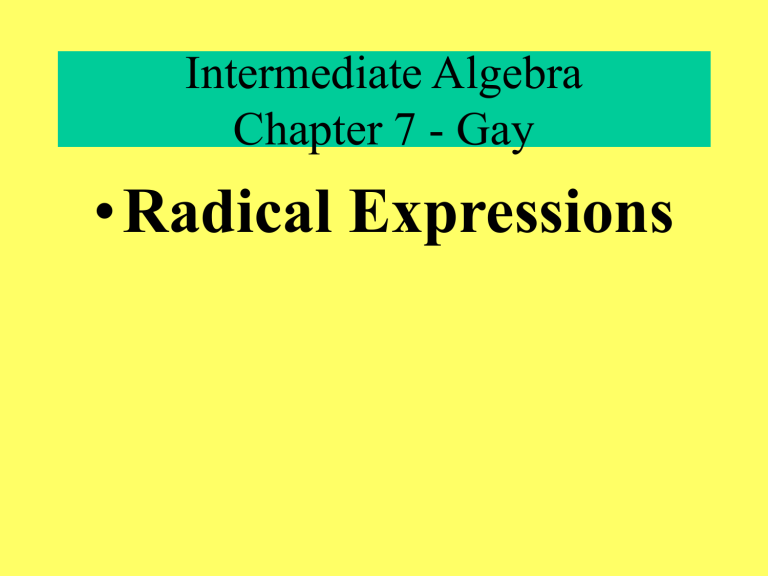
Intermediate Algebra
Chapter 7 - Gay
•
Radical Expressions
Oprah Winfrey
• “Although there may be tragedy in your life, there’s always to possibility to triumph. It doesn’t matter who you are, where you come from. The ability to triumph begins with you. Always.”
Angela Davis – U.S. political activist-1987 – Spellman college
• “Radical simply means grasping things at the root.”
Intermediate Algebra 7.1
•
Radicals
Objective
• Find the nth root of a number
Definition of nth root
• For any real numbers a and b and any integer n>1, a is a nth root of b if and only if a n b
Principal nth root
• Even roots
• Principal nth root of b is the nonnegative nth root of b.
• Represented by n b
n
b is radical n is index b is radicand
Graphs determine domain & range
( )
x
Graphs – determine domain & range
( )
3 x
Calculator keys
MATH
MATH
x
n n b
b
If b is any real number
• For even integers n n b
b
If b is any real number
• For odd integers n n n b
b
Objectives
• 1. Find the nth root of a number
• 2. Approximate roots using calculator.
• 3. Graph radical functions
• 4. Determine domain and range of radical functions.
• 5. Simplify radical expressions.
Intermediate Algebra 7.2
•
Rational Exponents
Rational Exponent – numerator of 1
• For any real number b for which the nth roof of b is defined and any integer n>1 n b
b
1 n
Definition of b n m b n m
m
n m b
Problem
8
2
3 8
1
3
2
2
2
2
4
2
8 3
[8][^][(2 / 3)][
ENTER
]
Negative exponents b
n b
m n
1 b n
1 b n m
Rule & example
n
n
25
16
1
2
1
1
16 2
16 2
1
4
25
25 2
5
Althea Gibson – tennis player
•“No matter what accomplishments you make, someone helped you.”
Intermediate Algebra 8.3
•
Properties
•
of
•
Rational Exponents
Properties of exponents m n a a
a a
0
1 a
1 a a m a n
a n a mn a n
a b b n n
n n n ab a b
Procedure: Reduce the Index
• 1. Write the radical in exponential form
• 2. Reduce exponent to lowest terms.
• 3. Write the exponential expression as a radical.
Objectives:
• 1. Evaluate rational exponents.
• 2. Write radicals as expressions raised to rational exponents.
• 3. Simplify expressions with rational number exponents using the rules of exponents.
• 4. Simplify radical expressions
Thomas Edison
• “I am not discouraged, because every wrong attempt discarded is another step forward.”
Intermediate Algebra 7.3
•
The Product Rule
•
for
•
Radicals
Product Rule for Radicals
• For all real numbers a and b for which the operations are defined n n
n a b ab
• The product of the radicals is the radical of the product.
Simplifying a Radical
Condition 1
• The radicand of a simplified n-th root radical must not contain a perfect n-th power factor.
Using product rule to simplify
• 1. Write the radicand as a product of the greatest possible perfect nth power and a number that has no perfect nth power factors.
• 2. Use product rule
• 3. Find the nth root of perfect nth power radicand.
• 4. Do all necessary simplifications
Sample problem
5 72
5 36 2
5 36 2
5 6 2
30 2
Sample Problem
5 64
9 12 x y
5 32 2
5 4 x x y
10 y
2
5 32
5 10
5 2
4 2 x y x y
2 5 2
4 2 xy x y
Winston Churchill
•“I am an optimist.”
Intermediate Algebra 7.5
•
The Quotient Rule
•
for
•
Radicals
Quotient Rule for Radicals
• For all real numbers a and b for which the operations are defined.
n n a
n a b n b
• The radical of a quotient is the quotient of the radical.
Simplifying a radical: condition 2
• The radicand of a simplified radical must not contain a fraction
7
9
3
9 x
3
Simplifying a radical – condition 3
• A simplified radical must not contain a radical in the denominator
.
5
4
7
3 3 x
Rationalizing the denominator
• Square Roots
• 1. Multiply both the numerator and denominator by the same square root as appears in the denominator.
• 2. Simplify.
Sample problem
5
5
6
6 6 6
30
30
36 6
Rationalizing a denominator containing a higher-order radical.
• Multiply the numerator and denominator by the expression that will make the radicand of the denominator a perfect nth power.
Example problem
3
3 2
3 3 2
2 3 2 3 2
2
3
3 3 4 3 4
3 8 2
Stanislaw J. Lec
•“He who limps is still walking.”
Intermediate Algebra 8.6
•
Operations
•
with
•
Radicals
Objective
• Add or subtract like radicals
Definition: Like Radicals
• Are radical expressions
• * with identical radicands
• and
• *
Identical indexes.
Procedure – Adding like radicals
• Simplify all radicals first.
• To add or subtract like radicals, add or subtract the coefficients and keep the radicals the same.
Procedure- multiplication with radicals
• Simplify all radicals first
• Use Product Rule
• Use distributive property
• Use FOIL if needed
Conjugates
• A+B and A-B are called conjugates of each other.
• Examples:
5
3
5
3
6
2
6
2
Rationalizing a binomial denominator with radicals
• Multiply the numerator and denominator by the conjugate of the denominator .
• Combine and Simplify
• Denominator cannot be radical
Rationalizing a binomial numerator with radicals
• Multiply the numerator and denominator by the conjugate of the numerator.
• Combine and Simplify
• Denominator cannot be radical
Objective
• Rationalize binomial denominator involving radicals.
Lance Armstrong
• “I didn’t just jump back on the bike and win. There were a lot of ups and downs, good results and bad results, but this time I didn’t let the lows get to me.”
Intermediate Algebra 7.7
•
Complex
•
Numbers
Definition: imaginary number i
• The symbol I represents an imaginary number with the following properties: i
1 and i
2
1
Definition
• For any positive real number n n i n
Definition: Complex Number
• A number that can be expression the form
• a + bi where a and b are real numbers and i is the imaginary unit.
a+bi
• a is called the real part
• b is called the imaginary part
• a+bi is standard form
• a+0i is a real number = a
• 0 + bi =bi is pure imaginary number
Set of Complex Numbers
• Set of Real numbers = R union with set of Imaginary numbers
= I is the set of Complex numbers=C
R I
C
Equality of Complex Numbers
• a + bi = c + di if and only if
• a = b and c = d
• Real parts are equal and imaginary parts are equal
Add and subtract Complex #s
• (a+bi)+(c+di) = (a + c) + (b + d)i
• (a+bi) - (c+di) = (a - c)+(b – d)I
• Add or subtract the real and imaginary parts.
Multiplication of complex numbers
• (a+bi)(c+di)=(ac-bd) + (bc+ad)I
• Translation:
• 1. Use FOIL
• 2. Substitute
• 3. Combine terms i
2
1
• 4. Write in standard form
7
2 i i
7
2 i i
7
7
2
2 i i
i
35 i
10 i
2
49
4 i
2
32
47
53 53 i Division of imaginary number by real number
• To divide a + bi by a nonzero real number c, divide real part and imaginary part by c.
a
bi a b c c c i
Division by Complex Numbers
• 1. Multiply numerator and denominator by complex conjugate of denominator.
• 2. Combine and simplify
• 3. *** Write in standard form.
Sample Problem
7
2 i i
7
2 i i
7
7
2
2 i i
i
35 i
10 i
2
49
4 i
2
32
47
53 53 i
George Simmel - Sociologist
•“He is educated who knows how to find out what he doesn’t know.”
